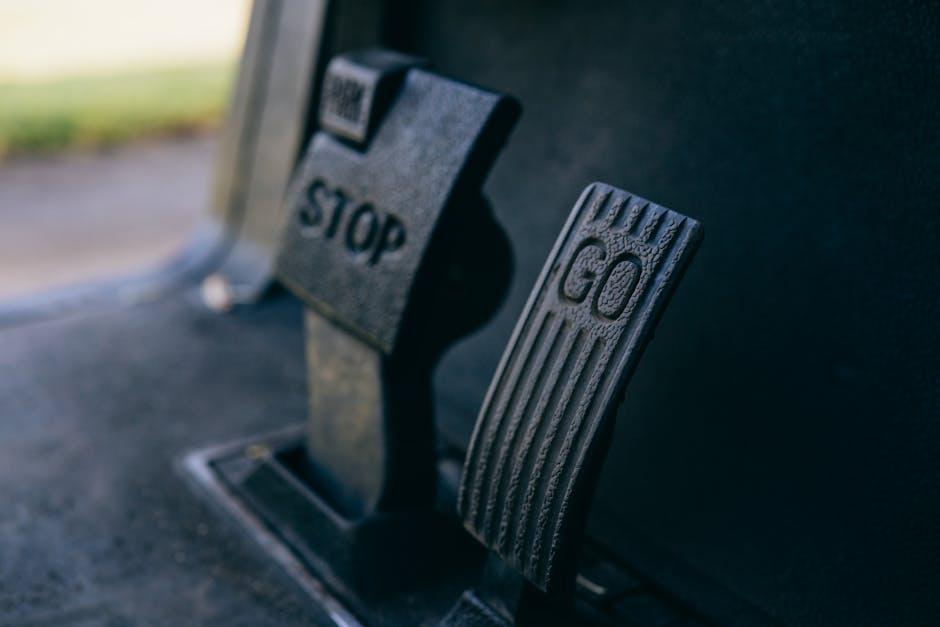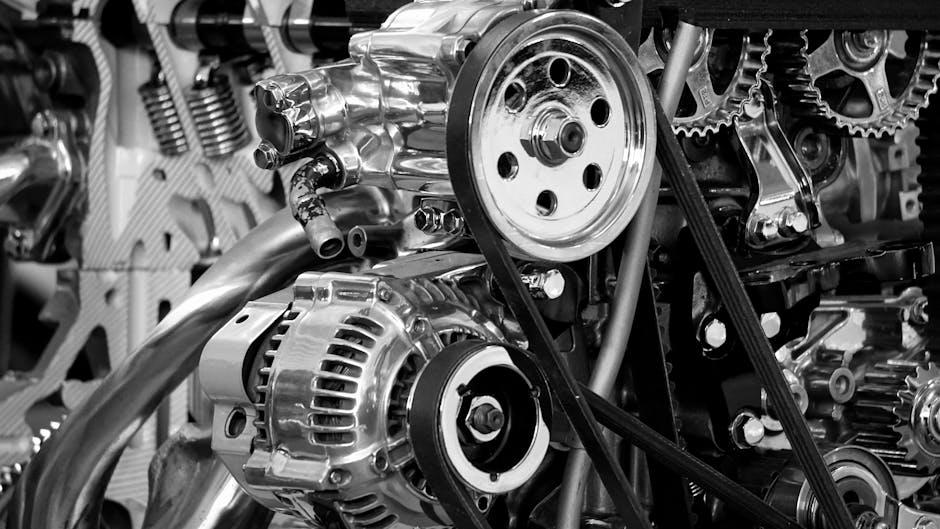Your vehicle’s transmission is often called the heart of the drivetrain—a complex system that silently shifts gears and keeps you moving smoothly. But like any hardworking part, it doesn’t always show obvious signs when something’s amiss. Knowing the early warnings that your transmission needs attention can save you from costly repairs and unexpected breakdowns. In this article, we’ll explore the subtle and not-so-subtle signs that it’s time to check under the hood and give your transmission the care it deserves. Whether you’re a seasoned driver or a car enthusiast, these insights will help you stay one step ahead on the road.
Table of Contents
- Unusual Noises and What They Mean
- Delayed or Rough Gear Shifting Explained
- Fluid Leaks and Their Impact on Transmission Health
- The Importance of Transmission Fluid Checks
- When to Seek Professional Transmission Service
- Q&A
- Wrapping Up

Noticing unusual behavior in your vehicle can be a clear indicator that your transmission is calling for help. Pay close attention to delayed gear engagement, where the car hesitates before shifting from park to drive. Another frequent symptom is slipping gears, which causes inconsistent acceleration and a sudden change in engine revs without corresponding speed increase. Drivers might also experience a burning smell, hinting that the transmission fluid is overheating or breaking down, which could lead to serious internal damage if ignored.
Additional signs include:
- Strange noises such as whining, clunking, or humming when the car is in neutral or shifting gears
- Fluid leaks beneath your vehicle, often appearing as red or brown spots
- Unresponsive gears or difficulty shifting, both in manual and automatic transmissions
- Warning lights like the check engine light flashing persistently
| Symptom | Possible Cause | Action Needed |
|---|---|---|
| Delayed gear engagement | Low or dirty transmission fluid | Check fluid; service or flush transmission |
| Gear slipping | Worn out clutch plates or bands | Inspect system; consider repair or replacement |
| Burning smell | Overheated transmission fluid | Flush fluid; identify overheating source |

Unusual Noises and What They Mean
When your transmission starts speaking up, it’s rarely friendly chatter. Strange noises often serve as early warnings of underlying issues waiting to spin out of control. Listen closely for grinding, whining, or clunking sounds—each carries a unique meaning. A persistent whining may hint at worn bearings or low transmission fluid, while clunking during gear shifts often signals misaligned gears or damaged synchros.
Common Noises and Their Possible Causes:
- Grinding: Hard shifts or slipping gears.
- Whining: Low fluid level or pump problems.
- Clunking: Damaged gears or mount issues.
- Buzzing: Fluid circulation issues.
| Noise | Common Cause | Urgency |
|---|---|---|
| Grinding | Worn gears | High |
| Whining | Fluid low or contaminated | Medium |
| Clunking | Loose mounts | Medium |
| Buzzing | Pump malfunction | High |
Ignoring these acoustic signals can lead to severe damage and costly repairs. Prompt diagnosis and attention ensure smooth driving and prevent those minor annoyances from escalating into major failures.

Delayed or Rough Gear Shifting Explained
When your vehicle hesitates or jerks during gear changes, it’s often a clear signal that something is amiss within the transmission system. These interruptions can range from subtle lags to abrupt shifts, making your driving experience uncomfortable and potentially hazardous. Causes can include worn-out clutch components, low transmission fluid levels, or malfunctions in the shift solenoids. Ignoring these symptoms may lead to further damage and costly repairs, so it’s important to address them promptly.
Common indicators of shifting issues include:
- Delayed engagement when shifting from park to drive
- Harsh or clunky gear changes during acceleration
- Grinding noises during gear shift attempts
- Irregular engine revving without corresponding speed changes
| Possible Cause | Effect on Shifting |
|---|---|
| Low Transmission Fluid | Sluggish gear engagement, overheating |
| Worn Clutch Plates | Delayed or rough shifts, slipping gears |
| Faulty Shift Solenoids | Erratic shifting patterns, inability to shift |

Fluid Leaks and Their Impact on Transmission Health
When it comes to the health of your vehicle’s transmission, the presence of fluid leaks is a silent alarm that should never be ignored. Transmission fluid is essential for lubricating the moving parts, cooling the system, and ensuring smooth gear shifts. A leak not only reduces the fluid level but also introduces the risk of overheating and increased friction, which can accelerate wear and tear. Spots of red or brown fluid under your car, a burning smell, or difficulty shifting gears often point to this critical issue. Detecting leaks early allows you to avoid costly repairs and keeps your transmission running smoothly.
Addressing fluid leaks promptly can save you from these common transmission problems:
- Overheating: Insufficient fluid cannot dissipate heat, leading to damage.
- Slipping gears: Lack of fluid pressure results in erratic gear shifts.
- Corrosion: Leaking fluid can corrode seals and gaskets.
- Complete transmission failure: Prolonged leaks may cause total breakdown.
| Symptom | Potential Cause | Recommended Action |
|---|---|---|
| Red Fluid on Driveway | Leaking Transmission Seal | Inspect and Replace Seals |
| Gear Slipping | Low Fluid Levels | Check Fluid & Top-Up |
| Grinding Noise | Insufficient Lubrication | Flush and Refill Fluid |

The Importance of Transmission Fluid Checks
Regularly monitoring your transmission fluid is crucial for maintaining the smooth operation of your vehicle. This vital fluid serves multiple functions—it lubricates the moving parts within the transmission, helps dissipate heat, and ensures seamless gear shifts. Neglecting these checks can lead to a breakdown of fluid quality, which often results in increased friction and overheating. Over time, dirty or low transmission fluid can cause significant wear and tear, leading to costly repairs or even complete transmission failure.
Pay attention to these key signs that your transmission fluid might need attention:
- Unusual odors: A burnt smell often indicates overheated or contaminated fluid.
- Color changes: Fresh transmission fluid is typically bright red; dark or brown fluid suggests it is degraded.
- Fluid leaks: Puddles or stains under your vehicle hint at possible transmission fluid loss.
- Shift delays or slips: Trouble changing gears smoothly can signal fluid issues impacting hydraulic pressure.
| Fluid Condition | What It Indicates | Recommended Action |
|---|---|---|
| Bright Red & Clear | Healthy and Effective | Continue Routine Checks |
| Dark Brown or Black | Burnt or Contaminated | Flush & Replace Fluid |
| Cloudy or Milky | Possible Water Contamination | Service Immediately |

When to Seek Professional Transmission Service
It’s essential to recognize when your vehicle’s transmission demands expert care before minor issues escalate into costly repairs. Persistent slipping gears, unusual noises while shifting, or a burning smell are clear warning signs that shouldn’t be ignored. Additionally, if you notice delayed engagement when shifting from park to drive, it’s a crucial indication that professional diagnostics are needed. Early intervention not only saves your transmission but also enhances overall vehicle safety and performance.
Below is a quick reference guide highlighting situations that warrant a transmission specialist’s attention:
| Symptom | Possible Cause | Recommended Action |
|---|---|---|
| Gear slipping | Worn clutch plates or low fluid | Check fluid, visit technician |
| Delayed shift engagement | Hydraulic or sensor malfunction | Get professional diagnosis |
| Grinding noise | Damaged gears or bearings | Stop driving, service immediately |
| Transmission fluid leak | Seal failure or crack | Inspect and repair fluid system |
Q&A
Q: What are the most common signs that my vehicle’s transmission needs attention?
A: Watch for slipping gears, delayed or rough shifting, strange noises like whining or clunking, and a burning smell. These are classic signals your transmission might be struggling.
Q: Why does my car hesitate or struggle to change gears smoothly?
A: Hesitation or jerky shifts often mean transmission fluid is low, dirty, or there’s internal wear. This can cause the transmission to struggle maintaining proper hydraulic pressure.
Q: Is it normal for my transmission fluid to have a burnt smell or dark color?
A: No. Healthy transmission fluid is typically bright red and smells slightly sweet. A burnt odor or dark color signals overheating or contamination, which can harm internal components.
Q: Can dashboard warning lights indicate transmission issues?
A: Absolutely. The Check Engine or Transmission Warning light can activate if the car’s computer detects transmission malfunctions. Don’t ignore these alerts—they’re your vehicle’s way of asking for help.
Q: How important is regular transmission maintenance?
A: Critical! Regular fluid changes and inspections extend transmission life and prevent costly repairs. Think of it as giving your car’s “brain and muscles” the care they need to perform optimally.
Q: What should I do if I notice signs of transmission trouble?
A: Schedule a professional inspection promptly. Early diagnosis can stop minor issues from turning into major failures, saving time, stress, and money.
Q: Can transmission problems affect overall vehicle safety?
A: Yes. A failing transmission can cause unexpected gear changes or lack of power, potentially leading to hazardous driving situations. Timely attention keeps both you and your vehicle safe.
Q: Are transmission repairs expensive?
A: They can be, especially if left untreated. Detecting and addressing problems early on usually means simpler, more affordable fixes than a full rebuild or replacement.
Q: How do I know if it’s time for a transmission flush or a complete service?
A: If fluid is dirty or smells burnt, shifting feels rough, or the vehicle displays warning signs, a transmission service is likely due. A technician can recommend a flush, filter change, or more extensive repairs based on condition.
Q: Can I drive my car if the transmission is showing signs of trouble?
A: It’s best to avoid driving if you notice serious symptoms. Continuing to drive a faulty transmission risks further damage and unsafe conditions. Seek professional help as soon as possible.
Wrapping Up
In the journey of vehicle ownership, your transmission quietly orchestrates the symphony of motion, often unnoticed until something goes awry. Recognizing the subtle—and sometimes glaring—signs that your transmission needs attention can save you from costly repairs and unexpected breakdowns. Whether it’s unusual noises, hesitation in shifting, or warning lights on your dashboard, paying heed to these signals ensures your drive remains smooth and reliable. Stay tuned to your car’s whispers, and give your transmission the care it deserves—because a healthy transmission is the heart of every smooth ride.


1 Comment
z2rfbq